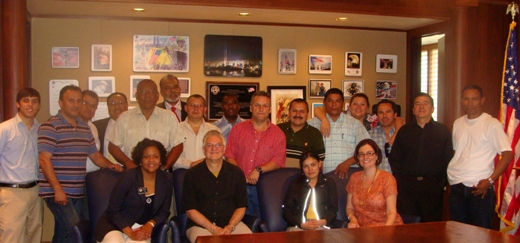
Every year the International Trade Union Confederation reports on anti-labor union repression worldwide. The news from last year was worse than ever.
Its report, released June 9, showed 101 unionists murdered, up 30 percent over 2008. Colombia accounted for almost half of the murder victims — 48. Other countries with large numbers of union members murdered were: Guatemala 16, Honduras 12, Mexico and Bangladesh six each, Brazil four, and the Dominican Republic and the Philippines three each. The report said India, Iraq and Nigeria had one murdered victim in each country.
The top three offenders, Colombia, Guatemala and Honduras, are recipients of U.S. military aid. In the case of Guatemala aid was dropped from 1990 to 2005 in support of local security forces, which engaged in violent repression of leftist political activists, including trade union leaders.
The ITUC also cited imprisonment, harassment and intimidation, murder attempts, and “serious death threats” applied to unionists worldwide, but “again mostly in Colombia and Guatemala.”
Strike breaking and union busting are ubiquitous. Workers generally lack the right to organize and bargain collectively, and most have to settle for informal or temporary work. Women, migrants and agricultural workers have special vulnerability, the reports says.
According to ITUC General Secretary Guy Ryder, “Colombia was yet again the country where standing up for fundamental rights of workers is more likely than anywhere else to mean a death sentence.” FECODE, the Colombian teacher’s union, took the major hit during 2009 with 19 murders, followed by the FENSUAGRO agricultural union that lost 11 members. In 2007, killers struck down 39 worker activists; in 2008, 49. Perpetrators are identified in only three percent of cases.
Nevertheless the International Labor Organization, a U.N. agency, accepted a Colombian government report of 28 workers killed during 2009. At a yearly review conference in Geneva, former Labor Minister Ana Lucia Noguera claimed unionist deaths were down 81 percent over seven years. The ILO ended up announcing early in June, Colombia’s removal from a long stay on an ILO “black list” of the world’s 25 most flagrant labor abusing countries, those requiring special attention.
Outgoing President Alvaro took the occasion to crow about “great news for Colombia,” resulting from “strengthening of work to protect workers’ rights and work to promote fraternal labor relations, different and opposed to class hatred.” Heading the Colombian delegation before the ILO, Colombia’s UN ambassador in Geneva Angelino Garzón chimed in similarly: Colombia is recognized “as a country with labor progress and union freedom.”
ILO waffling on Colombia is consistent with a modus operandi specified on its web site: the ILO “brings together representatives of governments, employers and workers to jointly shape policies and programs.”
Teamed with presidential candidate Juan Manuel Santos, Garzon is favored to become Colombia’s next vice president in second round voting on June 20. He is a former union leader, labor minister, and departmental governor. Observers see the presence of a labor credentialed candidate on a ticket identified with labor rights, human rights, and constitutional abuses as cover up. That and the drama in Geneva play out amidst media efforts to shore up U.S and European support for corporation – friendly free trade agreements and militarization.
However, not only did the ITUC report cite 48 unionist deaths last year – not 28 – but also a Colombian labor federation spokesperson from CUT affirmed that 2,721 labor union members have been assassinated over 23 years. One man or woman has been killed every three days, according to a respected human rights group.
U.S. corporations, including Chiquita and Drummond, have been tied to giving support to paramilitary groups suspected in many unionists’ murders. U.S. unions, especially the United Steelworkers, have ongoing solidarity campaigns with Colombian workers and unions. Both groups oppose a proposed U.S.-Colombia free trade agreement due to the anti-union violence.
During two weeks prior to the ITUC report’s release, gunmen killed three unionists and severely wounded another, bringing the toll so far this year to 29. According to CUT President Tarsicio Mora, there have been 527 unionist murder victims since 2002, when Uribe became president, although other estimates put the figure at around 600.
Colombia’s constitution recognizes the full gamut of labor rights. Yet only 4 percent of Colombia’s 18 million workers currently are union members, while only 1.2 percent benefit from negotiated union contracts.
Human rights advocates remind outside observers that other Colombians besides unionists confront terrible violence. The National Indigenous Organization of Colombia, for example, claims that “armed groups have killed more than 1,400 indigenous Colombians over the last decade,” with 114 indigenous people meeting violent deaths last year, almost twice those killed in 2008.
Photo: Colombian trade unionists meet with leaders of the Machinists Union during a tour of the United States. IAM










